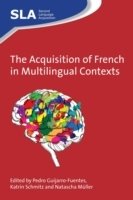This volume brings together new research from different theoretical paradigms addressing the acquisition of French. It focuses on the acquisition of French in combination with English, German, Russian or Spanish and enriches our understanding of the particularities of French and the role of language combinations in the acquisition process. The chapters examine the development of different grammatical aspects (word order phenomena, adjective placement, dislocation and cleft constructions, wh-questions, DP phenomena, argument omissions and constructions with particular word groups) and use various methodologies (such as elicitation tasks, longitudinal studies and parsing experiments) to further add to our understanding of how French is acquired in different contexts. This book will be a resource for researchers and graduate students working in the discipline of language acquisition, especially those who are interested in language contact phenomena where two typologically different languages are involved.

